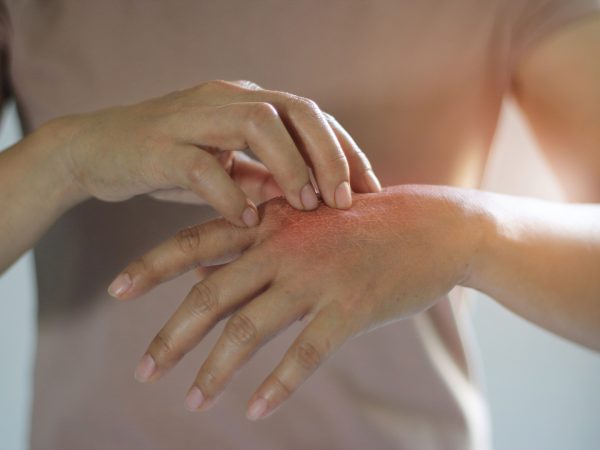Are You at Risk For Psoriasis?

Symptoms of psoriasis – a common, chronic condition in which the skin develops red, itchy patches and thick, silvery scales – can range from mildly annoying to disabling. Autoimmunity or inflammation is suspected as the core problem, and the course of the disease typically involves periods of symptom flares alternating with periods of remission. While there is no cure for psoriasis, there are natural treatments that can help prevent flare-ups.
Those at risk are usually people between age 10 to 40, often with a family history of the disease; people with HIV/AIDS; and children with recurring infections such as strep throat. The same types of infections can trigger a flare, as can injuries such as sunburn, cuts, or scrapes; dry or cold air; stress; lack of sunlight; smoking and heavy alcohol consumption; and certain medications can all be triggers.
Conventional treatment for psoriasis is designed to control symptoms at the skin level and prevent complications like infection and scarring. They include topical medications and light therapy. In addition to these measures, which may be necessary in severe cases, I recommend the following approaches to psoriasis:
- Dietary changes: Follow an anti-inflammatory diet, making sure to get plenty of fresh fruits and vegetables, particularly those rich in carotenoids (mangoes, corn, sweet potatoes, carrots and squash, as well as leafy greens and tomatoes). Some our trained integrative medicine providers find success in recommending a trial of gluten and/or dairy elimination for a period of at least 6 weeks to assess a potential connection to the inflammation so often driving psoriasis.
- Exercise: Regular physical activity may help.
- Mind/body: Learn breathing exercises, yoga or visualization, or keep a journal recording experiences, feelings, and skin symptoms. Since the skin is very responsive to hypnotic suggestion, hypnotherapy is definitely worth exploring.
- Traditional Chinese medicine: A TCM practitioner may recommend herbal preparations or acupuncture to help alleviate the condition.
Supplements: Take supplemental omega-3 fatty acids (1-2 grams a day total in EPA and DHA) and evening primrose oil (500 mg twice a day), a natural source of GLA (gamma-linolenic acid), a fatty acid that promotes healthy growth of skin, hair and nails. Taking an extract of milk thistle or silymarin (Silybum marianum), two capsules twice a day for at least three months, may also help.
Today’s Health Topics
Editor's Pick
Health Focus
Ask Dr. Weil's Q&A
| Weekly Wellness Bulletin |
| Sign up for our once a week, in-depth health bulletin - sent out on Thursdays. Dr. Weil shares the very latest from the ever-changing world of health and nutrition. Stay on top of the latest news in this doctor-reviewed weekly compilation. |
|










